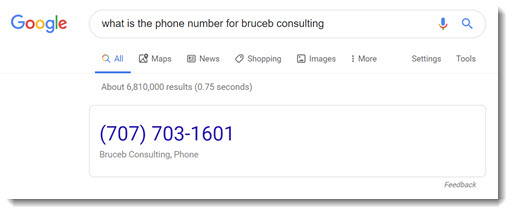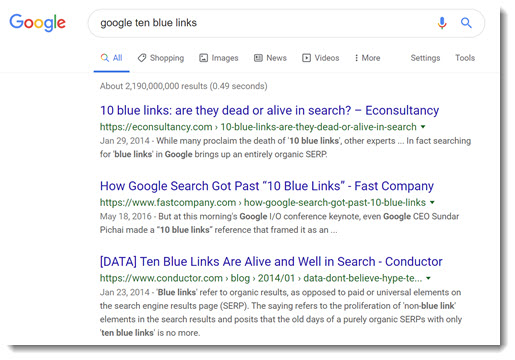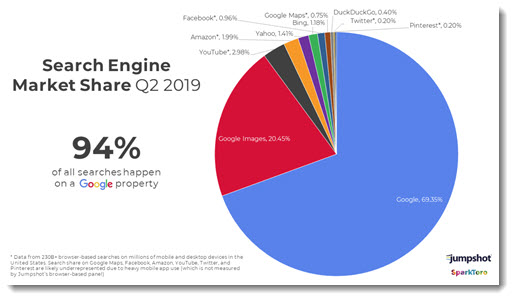
When you search for the phone number for Bruceb Consulting, Google shows the phone number.
Does that seem obvious? It’s a relatively recent change. Google only began serious efforts to provide One True Answer to search queries a few years ago. It completely changes Google’s role in the relationship between users and advertisers.
In June, for the first time, the majority of Google searches ended without a click on a search result. There is no need to click when Google provides a direct answer to a question, or features a snippet from another site that answers your question.
Big companies find it frustrating that Google answers our questions instead of sending you to their websites. The antitrust investigations and calls for Google to be broken up would theoretically be good for competition by sending you to websites run by other companies big and small. The pesky side effect is that it requires making Google less helpful. Google monopolizes search because we choose it.
As Ben Thompson put it: “If monopoly flows from a superior user experience, is mandating a worse user experience true to the ultimate goal of being pro consumer?“
Ten blue links – the world before zero-click searches

Think back to the early 2000s, when Google was establishing its dominance of the new world of the Internet. A Google search would bring up ten blue links on the first page of the search results. Google was so good at choosing the ten blue links that we seldom went to the second page of search results. Other search engines went out of business (Alta Vista) or changed their business model (Yahoo).
Google’s success at producing ten blue links changed our world. A large part of the global economy reorganized itself around a new business model built on Google searches. A Google search would lead to ten blue links; a user would click on one of the links; and the website at the other end would either show advertising or try to sell you something. For many years, “search engine optimization” was big business as everyone competed to rank high in Google search results.
To state the obvious: a business only benefits from ranking high in Google search results if you click on the link to see the website. That exposes you to the content that might convince you to use the business, or to the advertising that pays for the site, or to the goods for sale that you might buy. Appearing in Google search results by itself isn’t very valuable. It’s all about showing you the website.
How Google responded to a changing world
Four changes led Google to move beyond pages with ten blue links.
(1) Mobile – When we do a search on a small screen pulled from our pocket on the fly, we want an answer with no fuss. Searches on mobile device require a different experience than ten blue links on a monitor or laptop screen.
(2) Natural language searches – It has become second-nature to ask questions using natural language search. You can type questions as if you were asking someone out loud – “how high is the golden gate bridge?” Simple questions are easy for Google to handle but now it is also able to understand complex, multi-part questions. Google can understand superlatives, it can respond about particular points in time, and more.
(3) Voice assistants – When you ask a question out loud, the answer spoken back to you simply cannot be a verbal list of ten blue links. It must be the answer to your question, with no ambiguity.
(4) Google’s lead in AI – In response to consumer demand for direct answers, Google began using AI to analyze its ever-increasing stores of data and get better at answering questions. No other company is competing at anywhere close to Google’s level, and the gap keeps widening. Microsoft has effectively dropped out of trying to make Bing a consumer search engine. Apple recently announced its own baby steps to letting Siri answer questions directly but Google’s lead looks insurmountable.
Ask Google a question about something in the news and you’ll get an answer and perhaps the source of the answer. If Google does a good enough job of providing the answer, that’s exactly what you want.
For publishers and news organizations, that inability to force people to click to their websites is one of the reasons that their business model is crumbling.
The effect of zero-click searches on businesses
Zero-click searches have been increasing sharply since 2016. A study by marketing analytics firm Jumpshot concluded that just over 50% of all browser-based searches on desktop and mobile received zero clicks in June 2019.
Google has been stepping up its efforts to answer questions with featured snippets – a few sentences from a third-party website that answers the question. Google also presents its own knowledge panels when questions can be answered from its own databases of facts and data.
Having your website content presented in a featured snippet without a click defeats the entire business model for most business websites, which were built on search engine optimization, analytics of clicks, and revenue from advertising shown to you when you click. At best, appearing in a featured snippet is helpful for brand awareness – better than nothing, but not much better.
The antitrust problem
Google’s AI-driven expertise in answering questions directly is such an obvious boon for consumers that there will be little appetite to focus on it in an antitrust review.
There is, however, an interesting question of whether it’s appropriate for Google to answer questions with links to its own services. A couple of examples:
- If you ask for an address, Google will show you a map that links to more information in Google Maps – which is stuffed with ads run by Google’s ad network. There are no serious competitors to Google Maps, partially because Google Maps is awesome, but also because no competitor can ever get any traction.
- If you ask for flight information, Google will give you the info directly, along with links to Google Flights. Remember competitors like Expedia, Priceline, and Orbitz? They still exist but they’re being squeezed out.
- If you ask for a nearby restaurant, the top search results will be ads run through Google’s own ad network instead of links to Yelp or TripAdvisor or OpenTable or Zagat or any of the literally hundreds of other restaurant guide sites that depend on Google clicks to survive.
Google’s dominance in search is nearly complete. Google handles 94% of browser-based searches, according to a recent estimate, and the percentage goes up when searches from mobile apps are figured in.

In that context, perhaps it’s an antitrust problem that Google induces Internet users to click to Google properties. More than 10% of clicks from Google searches go to Google’s own properties – YouTube, Google Flights, Google Maps, Android, and more.
But searches that don’t result in any clicks at all because Google has answered our question: that’s a different issue. It’s not evidence of an antitrust problem, even if it makes it hard for businesses to find their footing.
If Google is forced by well-meaning regulators to stop answering our questions in the name of “increasing competition,” it will harm you in a way that you’ll notice every day.
There are tech company abuses that deserve scrutiny, but let’s ask our politicians and regulators to be clear-headed and nuanced, so they don’t cause more harm than good.

Thanks, useful information 🙂